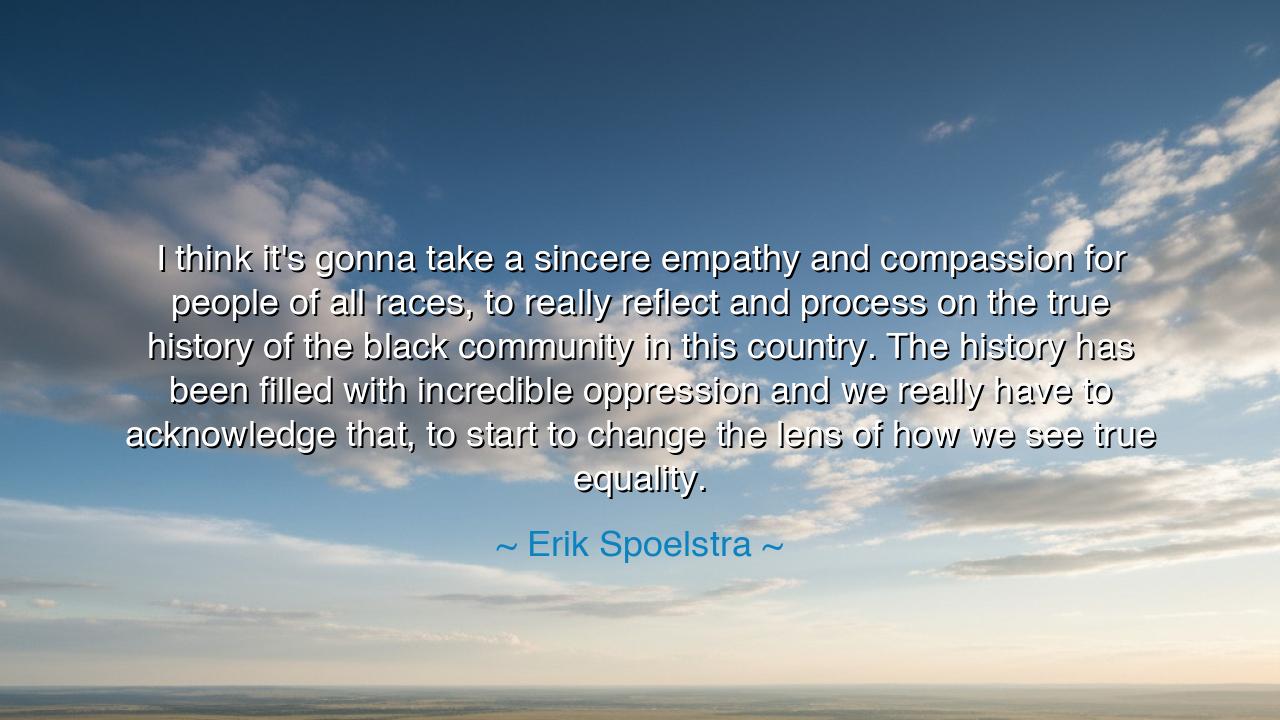
I think it's gonna take a sincere empathy and compassion for
I think it's gonna take a sincere empathy and compassion for people of all races, to really reflect and process on the true history of the black community in this country. The history has been filled with incredible oppression and we really have to acknowledge that, to start to change the lens of how we see true equality.






In the quiet power of his words, Erik Spoelstra speaks not as a coach of sport, but as a teacher of the human heart. He says, “It’s gonna take a sincere empathy and compassion for people of all races, to really reflect and process on the true history of the Black community in this country. The history has been filled with incredible oppression and we really have to acknowledge that, to start to change the lens of how we see true equality.” To hear this is to be reminded that before nations can heal, they must first remember. Before the world can stand in harmony, it must kneel in humility. His words are a summons—not of guilt, but of awakening—calling all souls to open their eyes and hearts to the truth that has too long been buried beneath the sands of comfort and denial.
In the age of the ancients, the elders would gather the tribe around the fire and tell them: “To forget the wounds of your brothers is to forget your own humanity.” The wisdom is eternal. Empathy—the act of feeling the suffering of another as if it were your own—is the highest form of strength. It does not weaken the spirit; it enlarges it. Compassion—the choice to see another’s pain and not turn away—is the seed from which true justice grows. Spoelstra’s words echo this ancient law: that understanding precedes equality, and only through deep reflection upon the truth of oppression can a people see clearly the path to freedom.
Consider the story of Nelson Mandela, who spent twenty-seven years in captivity under the weight of a cruel system designed to erase his people’s dignity. When he was freed, the world expected vengeance. Instead, he offered forgiveness born of compassion. “If I do not leave my bitterness behind,” he said, “then I am still in prison.” He understood that to build equality, one must first cleanse the heart. His empathy was not weakness; it was a mighty force that dismantled chains more enduring than iron—the chains of hatred and ignorance. Spoelstra’s call reflects that same wisdom: that only when we allow the truth of suffering to move us can we hope to see others not as enemies, but as mirrors of ourselves.
The history of the Black community in America is a river that runs deep with sorrow and resilience. It flows through centuries of bondage, through the cries of the enslaved, through the songs of hope sung in fields and churches, through the marches for civil rights, and into the voices still raised today. To deny that history is to close our eyes to the living pulse of human endurance. To acknowledge it, however painful, is to begin the healing. When Spoelstra speaks of “changing the lens,” he calls for more than awareness—he calls for transformation, a re-seeing of humanity through the eyes of truth.
For too long, the world has mistaken equality for sameness, justice for silence. But true equality demands courage—the courage to face uncomfortable truths, the courage to see where privilege blinds us, and the courage to act when inaction is easiest. To “reflect and process,” as Spoelstra says, is not a passive act. It is an inward battle against ignorance, a dismantling of the lies history has told, and a rebuilding of our understanding upon the rock of honesty and compassion. It is a spiritual labor as sacred as prayer, for it asks us to love others more deeply than we love our comfort.
And what, then, must we do? We must listen—truly listen—to the stories of those whose ancestors bore the weight of chains and whose descendants still bear the echoes of those wounds. We must educate ourselves not to boast of knowledge, but to restore dignity to those whom history has wronged. We must speak, even when silence feels safer, for silence is the ally of injustice. We must let our empathy become a living act: in our homes, our schools, our workplaces, and our hearts.
So let these words be a light passed down through generations: empathy is the bridge, and compassion is the road that leads to equality. When we walk that road together—acknowledging the pain of the past, honoring the truth, and vowing to never look away again—we rise not as divided peoples, but as one humanity. Let each of us, in our daily lives, practice the sacred art of seeing—seeing with the eyes of the soul, not of fear or pride. For in that seeing, the dream of equality ceases to be a dream and becomes a living reality, breathed into life by every heart that dares to care.






AAdministratorAdministrator
Welcome, honored guests. Please leave a comment, we will respond soon